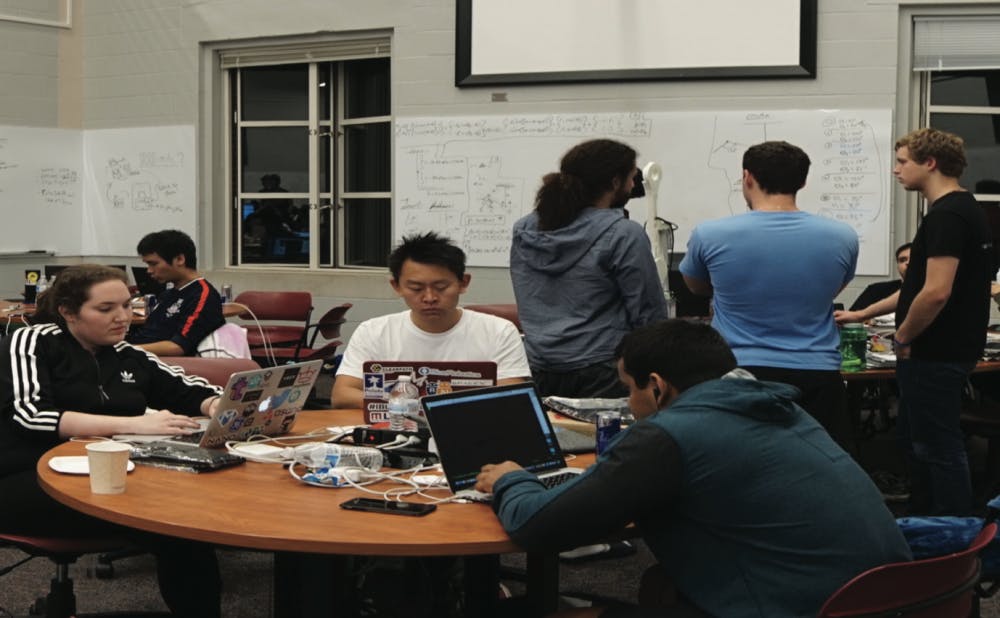The University hosted its second-annual student-run medical hackathon MedHacks this past weekend at the Bloomberg Center for Physics and Astronomy. The event brought together over 350 student hackers from the Hopkins community and beyond to discuss solutions for pressing health care issues.
The event drew a greater number of applicants this year compared to last year. While 400 students applied last year, about 1,500 students applied to MedHacks 2.0. It was also the University’s most productive hackathon to date, with the participants producing 48 projects in total.
The event began with participants forming teams and then devising projects which they would present to judges at the end of the weekend. The hackathon drew to a close with presentations from a total of 10 finalists, after which a panel of six judges selected the top three projects. Hopkins students contributed to two of the three projects that made it to the final round. The first-place team won $1,000, while the second-place and third-place teams were awarded $750 and $500, respectively.
The first-place team devised an app called Salutem that would help health facilities quickly and accurately identify the locations of people requiring immediate medical attention.
Hopkins graduate student Arman Mosenia, who was part of the Salutem team, discussed his team’s reasons for addressing the issue of frequently slow and inaccurate location identification.
“One of our teammates used to be an emergency medical technician (EMT) and had faced this issue many times,” Mosenia said. “Hearing his personal stories made us interested as well. When we looked into it further, we noticed it was a well-known problem and became determined to tackle it at MedHacks.”
In contrast to other medical hackathons, MedHacks does not have participants organized into teams prior to the event. Instead, individual students from various schools and areas of study form teams based on shared interest in a specific issue.
Sophomore Eric Huang, one of the two chief organizers, spoke to The News-Letter about the problem-and-solution pitch, the key strategy MedHacks uses to initiate team formation.
“We gather the participants into rooms with whiteboards and roundtables, and we encourage them to state problems they’ve seen in health care,” Huang said. “They go up to the stage, write a problem on the board and present ideas. People with interest in the same ideas would go up and form solutions on the spot. That way you have people who are interested in the same thing physically at the same location and then they’re talking to each other.”
Huang also touched on how MedHacks worked to incorporate people from various fields of study.
“The main core is making it really interdisciplinary,” he said. “Most hackathons have a paradigm of computer science majors or engineers. They’re very engineer-heavy. What we wanted to do was connect these people with people from public health or neuroscience. Our vision was that the computer science majors and engineers would have the technical expertise, but the public health and neuroscience majors would have the actual health knowledge.”
Huang discussed what his team’s vision had been for this year’s MedHacks: for the hackathon to branch out beyond the Hopkins community.
“We wanted to expand MedHacks from a regional to a truly national hackathon,” Huang said. “I think we actually reached that goal this year. There’s a huge [number] of schools, including Carnegie Mellon, Columbia, Stanford. Way too many to list.”
The greater diversity and number of participants are due primarily to MedHacks’ recent partnership with Major League Hacking (MLH), an organization responsible for promoting hackathons across the country. By becoming an MLH event, MedHacks was able to attract a more diverse group of applicants: half of the participants were Hopkins students, while the other half were from other parts of the country or even abroad.
Students such as Hopkins senior Steven Doria found that the combination of the problem and solution pitch and the greater diversity of participants this year proved a rewarding and challenging learning experience.
“I learned a lot about working with a team,” Doria said. “This was the most diverse group of people that I’ve done a project with, and it was interesting to see what everyone brought to the table. I would say the hardest part was coherently putting all our work together.”
In addition to a diversity of student participants, MedHacks also brought together a multitude of doctors from world renowned hospitals, including Hopkins’ own strong network of doctors.
“They’re the ones walking around talking with students, giving their feedback based off of their years of professional experience,” Huang said. “That’s the one area where we have a really big advantage, since we have so many medical professionals here that I would say other medical hackathons may not have.”
The event was also an opportunity for students to attend workshops held by representatives from companies like Redox and Johnson & Johnson. In addition, they were able to interact with entrepreneurs such as Hopkins alumnus Dave McClure, Founder of 500 Startups, who was invited to the event as a keynote speaker for the opening ceremony. During his presentation, McClure discussed his company, his struggles figuring out what he wanted to do prior to his company’s formation and the importance of risk-taking.
McClure’s presentation was followed by keynote speaker Karthik Prasad, chief of staff and business development at Nuna Inc. Prasad examined flaws in today’s health care system and what could be done address them.
“It takes three months for a doctor to sit in their back office, file a claim, for that claim to go to an insurance company and for that insurance company to do something about it,” Prasad told hackers last Friday. “Now imagine if you upped the stakes and it’s a surgery or a visit to the ER. Those things matter. Being able to understand when and how people use healthcare in a more real time basis. Think about that as you’re hacking away this weekend. Sometimes it’s the simple solutions.”
















Please note All comments are eligible for publication in The News-Letter.